|
|
|
Sort Order |
|
|
|
Items / Page
|
|
|
|
|
|
|
| Srl | Item |
| 1 |
ID:
114322


|
|
|
|
|
| Publication |
2012.
|
| Summary/Abstract |
This study discusses four European and American regulatory schemes designed for accounting lifecycle GHG emissions in relation to the Brazilian sugarcane ethanol. The objective is to critically examine the methodologies and associated parameters used in existing regulatory schemes for calculating GHG emissions, and to explore methodological convergences. The issues related to direct lifecycle and indirect land use change emissions have been addressed. It is found that there are commonalities between the European Renewable Energy Directive (EU-RED) and the UK's Renewable Transport Fuels Obligation (UK-RTFO), but the US-EPA's Renewable Fuel Standard (US-EPA) and the Low Carbon Fuel Standard of the California Air Resources Board (CA-CARB) vary greatly not only among themselves, but also in relation to the European regulations. Agricultural practices (especially soil carbon and nitrogen dynamics), co-product credits from surplus electricity and uncertainties around economic modeling approaches for indirect land use change are the major areas where methodological divergences exist. Incorporation of domestic agricultural practices, sugarcane mills operations, and realistic modeling of indirect impacts of land use change using regional models could provide more coherence in estimations of GHG emissions. Furthermore, the Brazilian trend of novelty in all phases of sugarcane bioenergy systems should be considered when projecting GHG emissions.
|
|
|
|
|
|
|
|
|
|
|
|
|
|
|
|
| 2 |
ID:
109606


|
|
|
|
|
| Publication |
2011.
|
| Summary/Abstract |
The growing interest in biofuels has led to increasing concern about their wider implications, particularly if grown for transport use in large scale. Such concerns include environmental, social and economic issues. To counterbalance the possible negative effects, a series of measures are being put in place to help their sustainability. Nevertheless, considering the different meanings of sustainability in different parts of the world and the need to expand productive rural activities, the differences between trying to assure a commodity and the benefits or impacts at local level raise the questions between the aims of sustainability and the need to comply with a market. The ideal situation would be to reconcile both aspects, which in practise represent a major challenge for governments and industry. This paper provides an overview on the sustainability assessment of biofuels to consider a possible way forward.
|
|
|
|
|
|
|
|
|
|
|
|
|
|
|
|
| 3 |
ID:
168667
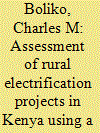

|
|
|
|
|
| Summary/Abstract |
This research is driven by the goal to develop human survivability studies, a solution oriented, trans-disciplinary academic approach for resolving multiple complex societal challenges. Given persisting poverty and inequality in rural areas of developing countries, as well as their vulnerability to the effects of climate change, there are high expectations that rural electrification using renewable energy can contribute to their sustainable development. We therefore use a sustainability framework to assess the contributions of four electrification projects in rural Kenya in ensuring the long-term well-being of local residents and future generations. Our results show that off-grid electrification projects run by the private sector were the better performers in the assessment. While more research is necessary to improve robustness, our preliminary policy recommendations are that Kenyan policy makers should provide further support to private sector-led off-grid solar electrification efforts.
|
|
|
|
|
|
|
|
|
|
|
|
|
|
|
|
| 4 |
ID:
127298


|
|
|
|
|
| Publication |
2014.
|
| Summary/Abstract |
Biodiesel production in Brazil has grown from 736 m3 in 2007 to 2.7 Mm3 in 2012. It is an emergent bioenergy for which it is important to guarantee environmental sustainability. The objective of this article is to characterise the biodiesel production chain in Brazil, to identify potential environmental impacts and to analyse key drivers and barriers for biodiesel environmental sustainability. This article explores these aspects and focusses on the increasing demand for the main feedstocks for biodiesel production in Brazil: soybean oil and beef tallow. The impacts of land use and land-use change on greenhouse gas emissions, biodiversity and water, as well as the energy balance, were found to be critical for the environmental sustainability assessment and development of biodiesel chains. Increasing agriculture yields, diversifying feedstocks and adopting ethyl transesterification can contribute to minimise environmental impacts. It was also found that environmental impacts could be mitigated by appropriate policies aiming at an integrated optimisation of food and bioenergy production and through agro-economic-ecological zoning, allowing adequate use of land for each purpose. Despite the limitation and weakness of some sustainability tools and initiatives, certification and zoning can play an important role in the sustainability of the emerging biodiesel production in Brazil.
|
|
|
|
|
|
|
|
|
|
|
|
|
|
|
|
| 5 |
ID:
109658
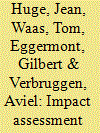

|
|
|
|
|
| Publication |
2011.
|
| Summary/Abstract |
As energy issues are at the top of the policy agenda worldwide, policy-makers increasingly need better decision-supporting processes to assist them in fostering a sustainable energy future. This paper reflects on the interpretation of sustainable development, and links these reflections with the theory and practice of impact assessment applied on energy issues. An analysis of existing impact assessment approaches with regard to their contribution to sustainable development leads to a set of principles for 'sustainability assessment'. Through a study of a participatory impact assessment supporting the development of a radioactive waste management plan in Belgium, the interpretational limits of sustainable development in a nuclear energy context are discussed. This paper sheds light on the complex context in which impact assessment exercises must contribute to sustainable energy development, with a focus on the nuclear energy-(un)sustainability nexus.
|
|
|
|
|
|
|
|
|
|
|
|
|
|
|
|
| 6 |
ID:
162957
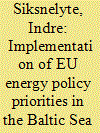

|
|
|
|
|
| Summary/Abstract |
The European Union (EU) has set ambitious goals for climate change and energy in its pursued policies (20% of renewable energy until 2020, 27% until 2030, and the aim to become the global leader in energy produced by renewable energy sources). Even more ambitious goals are established in the strategy of Energy 2050. Today European energy policy is oriented towards energy security, expansion of energy markets, energy efficiency, decarbonisation, and scientific research and innovations. The broader aim of this policy is a radical shift away from the current energy system to introduce a new system which would ensure environmental consistency, affordability of consumer prices, and security of supply. The paper analyses the trends of energy development across the eight Baltic Sea Region (BSR) countries. The analysis covers the period of 2008–2015. The main aim of the paper is to compare BSR countries achievements in sustainable energy development. The aggregate measures of energy sustainability are devised utilising multi-criteria decision-making (MCDM) MULTIMOORA (Multi-Objective Optimization on the basis of Ratio Analysis) technique. The paper presents an original framework for sustainable energy development indicators.
|
|
|
|
|
|
|
|
|
|
|
|
|
|
|
|
| 7 |
ID:
097252


|
|
|
|
|
| Publication |
2010.
|
| Summary/Abstract |
This paper explores the results and implications of an illustrative application of a sustainability assessment framework in the design and evaluation of a major integrated power system plan. The paper examines the integrated power system plan developed by the Ontario Power Authority in 2007. The basic framework rests on a generic set of evaluation criteria reflecting basic requirements for progress towards sustainability that was adopted, reinterpreted and applied by the Authority in support of its proposed plan. In response to evident deficiencies in the Authority's work, the authors and colleagues undertook a re-examination using a more fully elaborated sustainability assessment framework, specified for application to power system planning. The results point to a plan and plan components substantially different from those proposed by the Authority. More generally, the results highlight three advantages of applying such a sustainability assessment framework: comprehensive coverage of key requirements for progress towards sustainability while ensuring careful attention to the context and concerns of the sector; emphasis on identifying plan options that avoid major trade-offs among the sustainability criteria and recognition of interactions among the social, ecological, economic and technological realms favouring options that offer multiple, mutually reinforcing and lasting benefits.
|
|
|
|
|
|
|
|
|
|
|
|
|
|
|
|
| 8 |
ID:
150921
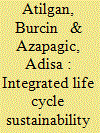

|
|
|
|
|
| Summary/Abstract |
This paper presents for the first time an integrated life cycle sustainability assessment of the electricity sector in Turkey, considering environmental, economic and social aspects. Twenty life cycle sustainability indicators (11 environmental, three economic and six social) are used to evaluate the current electricity options. Geothermal power is the best option for six environmental impacts but it has the highest capital costs. Small reservoir and run-of-river power has the lowest global warming potential while large reservoir is best for the depletion of elements and fossil resources, and acidification. It also has the lowest levelised costs, worker injuries and fatalities but provides the lowest life cycle employment opportunities. Gas power has the lowest capital costs but it provides the lowest direct employment and has the highest levelised costs and ozone layer depletion. Given these trade-offs, a multi-criteria decision analysis has been carried out to identify the most sustainable options assuming different stakeholder preferences. For all the preferences considered, hydropower is the most sustainable option for Turkey, followed by geothermal and wind electricity. This work demonstrates the importance for energy policy of an integrated life cycle sustainability assessment and how tensions between different aspects can be reconciled to identify win-win solutions.
|
|
|
|
|
|
|
|
|
|
|
|
|
|
|
|
| 9 |
ID:
127229
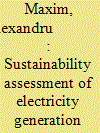

|
|
|
|
|
| Publication |
2014.
|
| Summary/Abstract |
Solving the issue of environmental degradation due to the expansion of the World's energy demand requires a balanced approach. The aim of this paper is to comprehensively rank a large number of electricity generation technologies based on their compatibility with the sustainable development of the industry. The study is based on a set of 10 sustainability indicators which provide a life cycle analysis of the plants. The technologies are ranked using a weighted sum multi-attribute utility method. The indicator weights were established through a survey of 62 academics from the fields of energy and environmental science. Our results show that large hydroelectric projects are the most sustainable technology type, followed by small hydro, onshore wind and solar photovoltaic. We argue that political leaders should have a more structured and strategic approach in implementing sustainable energy policies and this type of research can provide arguments to support such decisions.
|
|
|
|
|
|
|
|
|
|
|
|
|
|
|
|
| 10 |
ID:
128356
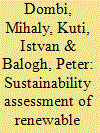

|
|
|
|
|
| Publication |
2014.
|
| Summary/Abstract |
Rationalisation of consumption, more efficient energy usage and a new energy structure are needed to be achieved in order to shift the structure of energy system towards sustainability. The required energy system is among others characterised by intensive utilisation of renewable energy sources (RES). RES technologies have their own advantages and disadvantages. Nevertheless, for the strategic planning there is a great demand for the comparison of RES technologies. Furthermore, there are additional functions of RES utilisation expected beyond climate change mitigation, e.g. increment of employment, economic growth and rural development. The aim of the study was to reveal the most beneficial RES technologies with special respect to sustainability. Ten technologies of power generation and seven technologies of heat supply were examined in a multi-criteria sustainability assessment frame of seven attributes which were evaluated based on a choice experiment (CE) survey. According to experts the most important characteristics of RES utilisation technologies are land demand and social impacts i.e. increase in employment and local income generation. Concentrated solar power (CSP), hydropower and geothermal power plants are favourable technologies for power generation, while geothermal district heating, pellet-based non-grid heating and solar thermal heating can offer significant advantages in case of heat supply.
|
|
|
|
|
|
|
|
|
|
|
|
|
|
|
|
| 11 |
ID:
118842
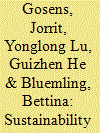

|
|
|
|
|
| Publication |
2013.
|
| Summary/Abstract |
Households in rural China rely heavily on low quality fuels which results in reduced quality of life and environmental degradation. This study assesses the comparative contribution of household scale biogas installations to the broad set of sustainability objectives in the Chinese biogas policy framework, which targets household budget, fuel collection workload, forest degradation, indoor air quality and health, renewable energy supply, and climate change. A household survey was used to determine how biogas affected consumption levels of crop residues, fuel wood, coal, LPG, and electricity. Biogas users were found to reduce consumption of biomass fuels but not coal. Although LPG is not a highly commonly used fuel in rural China, biogas users nearly cease to use it altogether. A big reduction in fuel wood consumption results in strongly reduced workload and forest degradation. Although household scale biogas has alleviated all sustainability issues targeted by Chinese policies, low quality fuel use remains abundant, even in households using biogas. Continued promotion of the construction of biogas installations is advisable, but additional policies are needed to ensure higher quality heating energy supply and cleaner uses of biomass fuels.
|
|
|
|
|
|
|
|
|
|
|
|
|
|
|
|
|
|
|
|
|